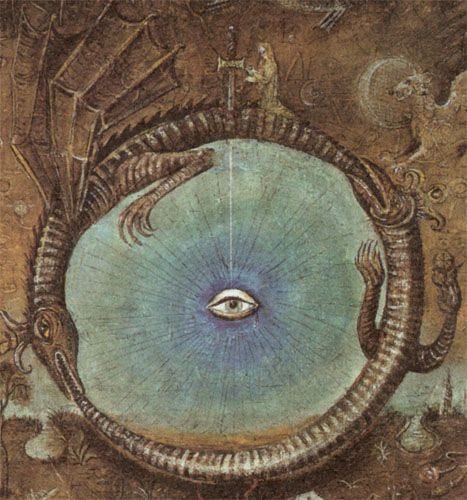diary entry #1: i hunger / i desire / i succumb
the role of cannibalism and immersion in religion and desire.
An intangible Him: a lurking shadow whose darkness affirms/charges/underscores the light. The Him is an oscillating chiaroscuro (the face in the dark of night whose features are so indistinct that they morph into a million possibilities over and over and over again). It (He? Him? - the nonsense of pronouns) has seemingly structured my consciousness, provided a framework to understand this troubling (this sublime) existence.
My grandmother has traveled from the Great Lakes to just east of the Smokies for this ceremonial honor—when I am to first devour the flesh and blood of Christ. A cannibalism? I sit in fear of eating another—an Other—but with this fear comes the strange undercurrent of carnal anticipation. As the masses surrounding me (these warm bodies of strangers) declare their love for the one upon whom we are about to feast (strange, humming incantations), I learn that the desire to devour is intrinsic to love.
Is this an ontological truth? Or a fiction perpetuated by the rituals derived from mythology? Is this why we hunger for the flesh of the eroticized figure? The object (subject?) of our desire?
It must come from the drive towards immersion, submersion, Oneness. To be divine is to become One. To be complete is to become One, but completion is never inherent; it must be acquired through the devouring, digestion, consumption.
The first figure in Barthes’s Fragments: A Lover’s Discourse:
“I am engulfed,
I succumb…”s’abîmer / to be engulfed
Outburst of annihilation which affects the amorous
subject in despair or fulfillment.…
The crisis of engulfment can come from a wound, but also from a fusion: we die together from loving each other: an open death, by dilution into the ether, a losed death of the shared grave.
Engulfment is a moment of hypnosis. A suggestion functions, which commands me to swoon without killing myself. Whence, perhaps, the gentleness of the abyss: I have no responsibility here, the act (of dying) is not up to me: I entrust myself, I transmit myself (to whom? to God, to Nature, to everything…).
Or, perhaps, from Diderot: “Bring your lips to mine / so that out of my mouth / my soul may pass into yours” (Chanson dans le goût de la romance).
Another vision strikes from these early days of Catholic rooting, as a seed sprouts its pale limbs.
A memory, potentially (most certainly) false: My grandfather’s pale, powder-like face lies still in a coffin; I try to pry his eyelids open with grubby fingers and meet the gaze of eternal sleep—a milky white abyss.
A memory, real: I wake my father in the same fashion and shriek with laughter when he pretends to gobble up my fingers.
A memory, hovering between the false and the real: I kneel at my bedside with my grandmother. She teaches me how to pray: “Now I lay me down to sleep / I pray the Lord my soul to keep / If I die before I wake / I pray the Lord my soul to take.” She tucks me in, kisses me goodnight, and tells me that my guardian angel will watch over me as I rest.
(I dream that an angel with a thousand white and bloodless eyes reaches into the open cavity of my chest and places my soul on her tongue and swallows it whole.)
Again, I am seven for my First Communion, dressed in white. I am in a Church. My grandmother has traveled here. I am surrounded by a thousand warm and tender bodies.
The Priest (who now, in my memory, stands without a face, stretched skin muffling every word, every blessing) raises a round disk of flesh, extols it above his head, and then raises a chalice, extols it above his head. In my impressionable youth, I see a small blue light descend from above and illuminate the chalice. I figure it now to be a hallucination (a trick of the light, a bend in the shadow), but my grandmother whispers back to me that it was a small fissure in the veil.
I stand in a long procession of veils. I remove my gloves. I lift my cupped palms. The Priest places His flesh in my hands and I place it on my tongue and I swallow it whole. (I am later told that the wafer is meant to dissolve.) My face pinches at the bitterness of the wine—of the blood.
Theophagy
noun
thē'äfƏjē
: the sacramental eating of a god typically in the form of an animal, image, or other symbol as part of a religious ritual and commonly for the purpose of communion with or the receiving of power from the god.
What power does the object of our desire hold that so makes us want to consume Him? Within the Catholic doctrine, it is this representation of perfection, of purity, of light. Consumption leads to sublimination which leads to the absolvance of sins, eradication of darkness, and total surrender into Absolute / Oneness.
But when I gaze upon the subject of my desire (not Him, but Man; not Divine, but Mortal), consumption certainly still binds my attachment.
It is our custom to consume the person we love. Taboo flesh: swollen genitalia nipples the scrotum the vulva the soles of the feet the palms of the hand heart and liver taste best. Cannibalism is blessed.I’ll wear your jawbone round my neck listen to your vertebrae bone tapping bone in my wrists. I’ll string your fingers round my waist— what a rigorous embrace.[…]Sunday there’s Mass and communion and I’ll put your relics to rest.– Gloria Anzaldúa, Borderlands / La Frontera: The New Mestiza
And this desire to consume is paired with a desire to surrender: “I am engulfed, I sucumb.” But it is not sparked from this vision of perfection nor purity nor paragon, but rather the affinity of imperfection. I will not and I cannot love (desire) that which is perfect, because I myself am full of darkness and deception and despair. When I feel the thrum of His (Man’s) pulse beneath my lips, I am thrilled by his flaws, his mortality. I see Him (I crave Him) in his own totality; and in Him, I see myself and recognize that I too am worthy of desire, of consumption.

To sigh: “to sigh for the bodily presence”: the two halves of the androgyne sigh for each other, as if each breath, being incomplete, sought to mingle with the other: the image of the embrace, in that it melts the two images into a single one: in amorous absence, I am, sadly, an unglued image that dries, yellows, shrivels.
– Roland Barthes, Fragments: A Lover’s Discourse
It is towards His capacious, mercurial gravity that I succumb. For my body [my flesh] is not meant to exist without perception, without consumption; for my spirit [my blood] is not meant to thrum without this veil of flesh that embodies [that shrouds] my mystery. Who shall dig under my skin—who shall pierce my veil—and make a home in my bones?
I am supposed to be touched. I can’t wait to find the person who will come into the kitchen just to smell my neck and get behind me and hug me and breathe me in and make me turn around and make me kiss his face and put my hands in his hair even with my soapy dishwater drips. I am a lovely woman. Who will come into my kitchen and be hungry for me?
– Jenny Slate, Little Wierds
References:
Roland Barthes, A Lover’s Discourse: Fragments, 1978. French title: Fragments d’un discours amoureux.
Denis Diderot, La promenade du skeptique, 1830.
Gloria Anzaldúa, Borderlands / La Frontera: The New Mestiza, 1987.
Jenny Slate, Little Wierds, 2019.
Suggested reading:
Robert Greene, The Art of Seduction, 2001.
E.M. Cioran, A Short History of Decay, 1949. French title: Précis de décomposition.
Byung-Chul Han, The Agony of Eros: Untimely Meditations, 2017.
Suggested listening:
Ethel Cain, Preacher’s Daughter, 2022.
The Smashing Pumpkins, Machina / The Machines of God, 2002.





